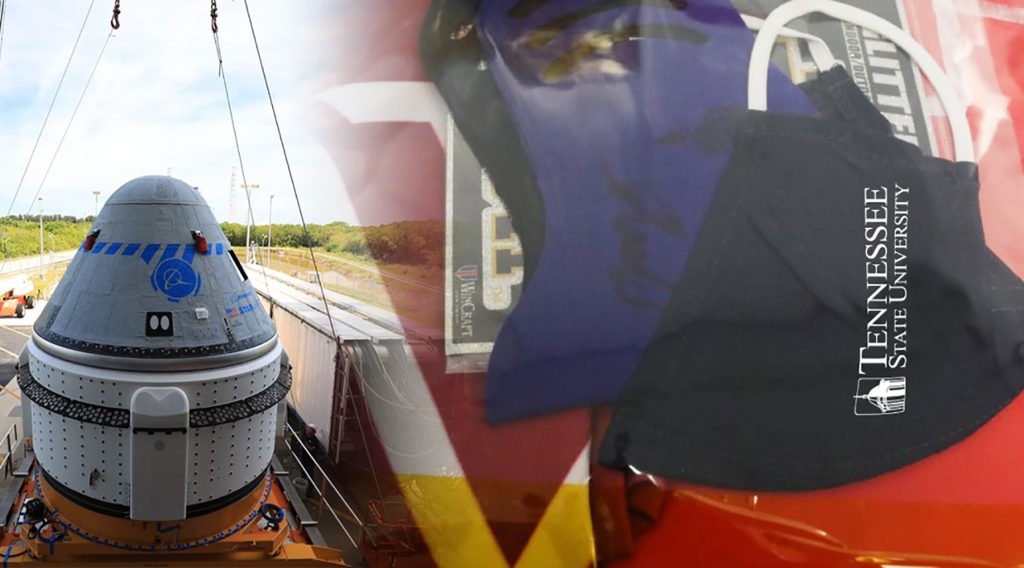By Emmanuel Freeman
NASHVILLE, TN (TSU News Service) — Items representing Tennessee State University’s legacy of excellence were part of the cargo onboard a Boeing spacecraft that recently returned to earth after a successful six-day mission to the International Space Station.
TSU was one of 14 historically black colleges and universities (HBCUs) asked to send flags, small pennants and other items representing their institutions, to be flown onboard Boeing’s CST-100 Starliner spacecraft as part of NASA’s Commercial Crew Program. The unmanned spacecraft for Orbit Flight Test-2 or OFT-2, launched May 19. It returned to earth May 25, making a safe landing at White Sands Space Harbor in New Mexico. The successful mission capped a major milestone for the aerospace giant, having failed in its previous attempt about a year earlier.
“Tennessee State University is proud to be among the 14 historically black colleges and universities that Boeing recognized on the space flight of its CST-100 Starliner with flags, pennants, and other items,” said TSU President Glenda Glover. “We are proud of our partnership with Boeing, which has led to internships and other opportunities that have propelled many of our students to successful careers. This recognition shows Boeing’s commitment to equity and inclusion, and highlights, once again, the importance of HBCUs.”
TSU and Boeing have a longstanding relationship that has included grants and funding for various research, training and engineering projects, as well as providing employment and internship opportunities for TSU students.
Ed Gerding, Boeing’s vice president and chief engineer and a long supporter of TSU, said the OFT-2 mission had very special meaning to him because pennants representing TSU were among those on board as the space craft journeyed to the International Space Station and safely landed back on Earth.
“When I receive the pennants back, I plan to visit TSU with these as a recognition of the strong partnership we’ve built between the university and the Boeing Company,” said Gerding, who is responsible for training, digital and international engineering and global services at Boeing.
Kenneth Rolle II, president of the Student Government Association, said he’s thankful for the partnership between TSU and Boeing and for the spotlight on HBCUs.
“As far as the mission to space and having those paraphernalia from HBCUs and Tennessee State University that’s major, because HBCUs are rarely heard of in conversation about going to space,” Role said. “So, this just shows how global HBCUs really are.”
The higher education mementos from the 14 institutions were part of the approximately 760 pounds of cargo that flew inside the Starliner’s crew module when it launched to the International Space Station for OFT-2. The end-to-end test was a critical developmental milestone on the company’s path toward flying crew missions for NASA.
Dr. Lin Li, interim dean of the College of Engineering, said TSU is fortunate to have Boeing’s continued investment.
“Congratulation for the successful launch of Boeing’s CST-100 Starliner spacecraft to the International Space Station,” Lin said. “Boeing continues to invest in the students and academic programs in the College of Engineering. The company’s Recruitment and Retention Initiative for Students in Engineering (RISE) program at TSU identifies high achieving students to receive scholarships as recognized Boeing Scholars. In addition, Boeing’s funding helps support students’ professional development in preparing for the workforce.”
Besides TSU, the represented universities with which Boeing also has a recruiting relationship are Clark Atlanta University, Morehouse College, Alabama A&M University, Florida A&M University, Howard University, Morgan State University, North Carolina A&T; Prairie View A&M University, Southern University and A&M College in Louisiana; South Carolina State University, Spelman College and Tuskegee University.
For more information on the College of Engineering, visit https://www.tnstate.edu/engineering/moreaboutus.aspx


